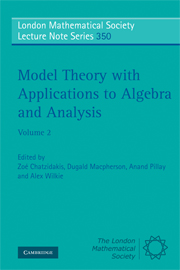Book contents
- Frontmatter
- Contents
- Preface
- Contributors
- Conjugacy in groups of finite Morley rank
- Permutation groups of finite Morley rank
- A survey of asymptotic classes and measurable structures
- Counting and dimensions
- A survey on groups definable in o-minimal structures
- Decision problems in Algebra and analogues of Hilbert's tenth problem
- Hilbert's Tenth Problem for function fields of characteristic zero
- First-order characterization of function field invariants over large fields
- Nonnegative solvability of linear equations in ordered Abelian groups
- Model theory for metric structures
Preface
Published online by Cambridge University Press: 04 August 2010
- Frontmatter
- Contents
- Preface
- Contributors
- Conjugacy in groups of finite Morley rank
- Permutation groups of finite Morley rank
- A survey of asymptotic classes and measurable structures
- Counting and dimensions
- A survey on groups definable in o-minimal structures
- Decision problems in Algebra and analogues of Hilbert's tenth problem
- Hilbert's Tenth Problem for function fields of characteristic zero
- First-order characterization of function field invariants over large fields
- Nonnegative solvability of linear equations in ordered Abelian groups
- Model theory for metric structures
Summary
These two volumes contain both expository and research papers in the general area of model theory and its applications to algebra and analysis. The volumes grew out of the semester on “Model Theory and Applications to Algebra and Analysis” which took place at the Isaac Newton Institute (INI), Cambridge, from January to July 2005. We, the editors, were also the organizers of the programme. The contributors have been selected from among the participants and their papers reflect many of the achievements and advances obtained during the programme. Also some of the expository papers are based on tutorials given at the March – April 2005 training workshop. We take this opportunity, both as editors of these volumes and organizers of the MAA programme, to thank the Isaac Newton Institute and its staff for supporting our programme and providing a perfect environment for mathematical research and collaboration.
The INI semester saw activity and progress in essentially all areas on the “applied” side of model theory: o'minimality, motivic integration, groups of finite Morley rank, and connections with number theory and geometry. With the exception of motivic integration and valued fields, these topics are well represented in the two volumes.
The collection of papers is more or less divided into (overlapping) themes, together with a few singularities. Aspects of the interaction between stability theory, differential and difference equations, and number theory, appear in the first six papers of volume I.
- Type
- Chapter
- Information
- Model Theory with Applications to Algebra and Analysis , pp. ix - xiiPublisher: Cambridge University PressPrint publication year: 2008

